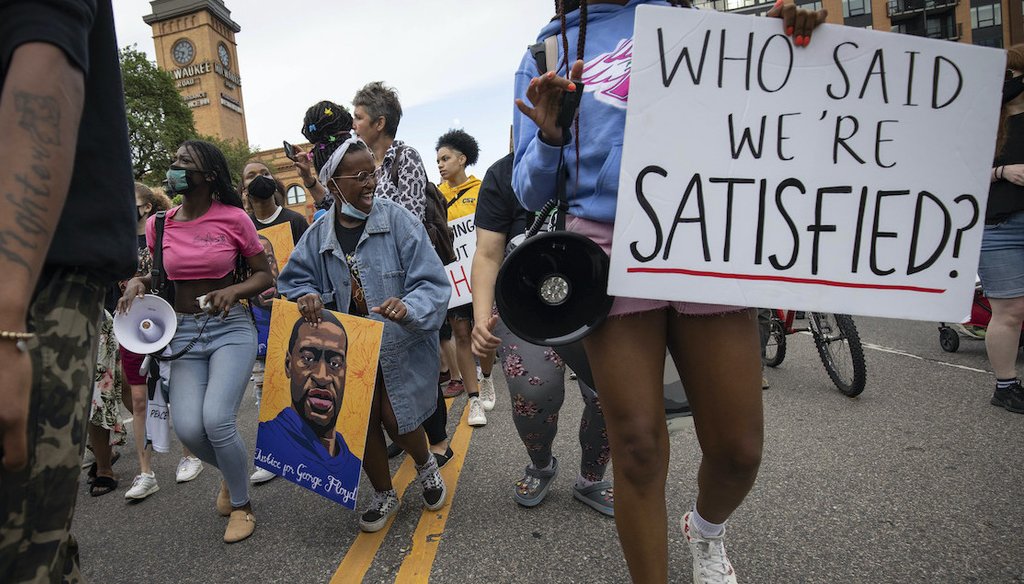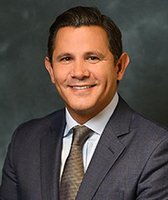Stand up for the facts!
Our only agenda is to publish the truth so you can be an informed participant in democracy.
We need your help.
I would like to contribute

People march for the one year anniversary of George Floyd's death on Sunday, May 23, 2021, in Minneapolis, Minn. (AP)
If Your Time is short
-
In June 2020, Republicans and Democrats wrote competing versions of police reform. Neither became law.
-
The conviction of Derek Chauvin, the police officer who murdered George Floyd, led to renewed calls to pass a bill.
-
Qualified immunity, which protects police officers from civil lawsuits, remains a sticking point in ongoing negotiations between lawmakers from both parties.
Thousands of people protested in cities and towns across the U.S., day after day and night after night, demanding racial justice and police reform. George Floyd’s death on May 25, 2020, launched one of the loudest, most sustained national calls for lawmakers to reexamine decades-long practices that outraged critics say allow police to avoid accountability.
But on the first anniversary of Floyd’s death, Congress finds itself in the same place as it was a year ago: partisan disagreement over how to move forward.
Following Floyd’s murder at the hands of a police officer May 25, 2020, Senate Republicans and House Democrats wrote separate proposals for police reform. Amid partisan bickering, efforts fizzled out just weeks later.
But the April conviction of former police officer Derek Chauvin on murder and manslaughter charges renewed the sense of urgency to change law. President Joe Biden called on Congress to pass a police reform bill by the anniversary of Floyd’s death, a deadline that won’t be met.
Sen. Tim Scott of South Carolina is leading the negotiations on the Republican side while U.S. Rep. Karen Bass of California, and Sen. Cory Booker of New Jersey are directing negotiations for the Democrats. While those discussions are active, no final agreement has been reached.
David A. Harris, a law professor at the University of Pittsburgh who hosts a podcast on criminal injustice, said he thinks it’s still possible Congress will enact some change.
"It seems like there has never been a stronger public climate for police reform, and it’s not just an issue for African Americans," Harris said. "The desire for this is strong almost everywhere. But it's both a fact that Congress is hyper partisan, and that the party on the right has taken positions that strongly adhere to law enforcement desires so often that it's very hard to envision a compromise."
Here’s a look at the status of those negotiations and the sticking points.
There were similarities in the proposals that Scott and House Democrats put forward. Both proposals, for example, made lynching a federal hate crime, increased data collection and provided funding for body cameras. While Scott’s bill called for incentives, grants and study, the Democrats’ version created more mandates. The proposals also had other key differences:
-
Qualified immunity: Democrats sought to limit qualified immunity, a judicial standard that protects officers from lawsuits if they were acting in their official capacity — unless they have violated a "clearly established" statutory or constitutional right. While the Democrats want to make it easier to sue police in civil cases, Scott’s bill didn’t propose any change.
-
Chokeholds: Both aimed to curtail police use of chokeholds — a manner of restraining a person that can restrict breathing — but Scott’s bill had a more narrow definition of chokeholds than the Democrats’ bill. Both cut off grant funding to agencies as an incentive to create chokehold policies.
-
No-knock warrants: The Democrats’ bill banned the use of federal no-knock warrants in drug cases. It also prohibited state and local agencies from receiving funds if they didn’t have a law prohibiting no-knock warrants in drug cases. Scott’s bill called for police agencies to report their use of no-knock warrants to the attorney general.
Those differences remain sticking points in negotiations between the two sides, with qualified immunity causing perhaps the biggest divide.
The U.S. Supreme Court created the qualified immunity defense in 1967, wrote UCLA law professor Joanna Schwartz in the University of Chicago Law Review.
"At the time, they called it a good faith immunity for constitutional violations," Schwartz told WBUR. "But now the way the court has defined qualified immunity, it protects government officers, including law enforcement, from damages, civil damages. So it doesn't apply to criminal cases, unless an officer has violated what the court calls clearly established law."
Some Democrats believe that qualified immunity allows officers to use excessive force without fear of consequences or accountability, said Carol A. Archbold, a criminal justice professor at North Dakota State University. But some Republicans assert that qualified immunity allows officers to make split second decisions in dangerous situations without worrying about being held liable.
Scott has offered a compromise: allowing victims to sue police departments rather than individual officers.
"The real question is how do we change the culture of policing?" Scott said May 2 on CBS’ Face the Nation. "I think we do that by making the employer responsible for the actions of the employee. We do that with doctors. We do that with lawyers. We do that in almost all of our industries. And if we do that in law enforcement, the employer will change the culture."
It’s unclear how many Democrats would accept such a compromise. Ten progressive House members sent a letter to leadership opposing removal of provision that would end qualified immunity.
"Given that police violence, as a weapon of structural racism, continues to have devastating and deadly consequences for Black and brown lives across our country, we strongly urge you to not only maintain but strengthen the provision eliminating qualified immunity as negotiations in the Senate continue," they wrote.
With law enforcement officers counting as a key Republican constituency, GOP lawmakers are hesitant to change a longstanding practice that protects uniformed officers.
"I can tell you, a lot of law enforcement agencies are very concerned about it and what it would mean for their bottom line," Sen. Marco Rubio, R-Fla, told the Washington Post. "What they’re saying is we’re now going to get sued every time we pull somebody over. . . . We’re just going to have hundreds and hundreds of lawsuits, and we’re going to hire an army of lawyers."
Senate Republican Leader Mitch McConnell said during a visit in Kentucky that he would not support police reform bills that do not keep qualified immunity for police officers.
"Being a police officer is a difficult job," McConnell said. "You have to break up fights, you have to be physical, and it’s challenging. I think qualified immunity for police officers needs to continue because without it I don’t know how we get anybody to be a police officer."
If Congress fails to pass legislation that would set rules for all 18,000 police agencies nationwide, that leaves police reform in the hands of local and state officials, or voter referendums. About half the states have enacted policing policy laws since Floyd’s death, according to the National Conference of State Legislatures.
Scott, Booker and Bass haven’t divulged much about the details, but on May 24 — the eve of the one-year anniversary of Floyd’s death — they released a joint statement indicating that they will continue negotiations.
"While we are still working through our differences on key issues, we continue to make progress toward a compromise and remain optimistic about the prospects of achieving that goal," they wrote.
RELATED: Unions limit police accountability, but Moore claim exaggerates impact
RELATED: Biden pauses promise to form police oversight commission
RELATED: Under Biden, Justice Department resumes investigations of police agencies
Our Sources
Congressional Research Service, Policing the Police: Qualified Immunity and Considerations for Congress, Updated June 25, 2020
Politico, Can Politics Handle Police Reform in 2020? An Expert Roundtable, Oct. 15, 2020
Washington Post, Policing deal remains out of reach on Capitol Hill as the anniversary of George Floyd’s death approaches, May 19, 2021
Congress.gov, H.R.7120 - George Floyd Justice in Policing Act of 2020, House vote June 25, 2020
Congress.gov, H.R.1280 - George Floyd Justice in Policing Act of 2021, House vote March 3, 2021
U.S. Department of Justice, Department of Justice Announces Investigation of the Louisville/Jefferson County Metro Government and Louisville Metro Police Department, April 26, 2021
U.S. Department of Justice, Attorney General Merrick B. Garland Announces Investigation of the City of Minneapolis, Minnesota, and the Minneapolis Police Department, April 21, 2021
The Hill, Bass signals George Floyd police reform bill won't meet May 25 deadline, May 19, 2021
USA Today, President Biden's promises on policing reform: What the administration has accomplished, May 4, 2021
Rev.com President Joe Biden Speech Transcript to Congress, April 28, 2021
New York Times, It May Soon Be Easier to Sue the N.Y.P.D. for Misconduct, March 25, 2021
FORBES, New York City Bans Qualified Immunity For Cops Who Use Excessive Force, April 29, 2021
Trib Live, Pittsburgh, Allegheny County voters approve no-knock warrant ban, solitary confinement restrictions, May 19, 2021
University of Chicago Law Review article by Joanna Schwartz, Qualified Immunity’s Boldest Lie, July 2020
WBUR, How Reforming Qualified Immunity Could Transform Policing In America, May 5, 2021
Bowling Green Daily News, McConnell criticizes infrastructure plan during Scottsville visit, May 7, 2021
NBC political reporter Sahil Kapur, Tweet, May 24, 2021
Poynter.org, A year after George Floyd’s death, little has changed, May 24, 2021
PolitiFact, Bipartisan police reform has been a struggle in the Senate. Here’s the story, April 30, 2021
Telephone interview, David A. Harris, University of Pittsburgh law professor and host of Criminal Injustice Podcast, May 21, 2021
Email interview, Carol A. Archbold, North Dakota State University criminal justice professor, May 21, 2021
Jill Snider, policy director of criminal justice and civil liberties at the R Street Institute, Statement to PolitiFact, May 24, 2021
Email interview, Ahmed Elsayed, US Sen. Cory Booker (D-NJ) spokesperson, May 24, 2021


































